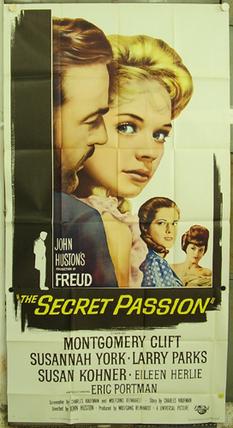FREUD: THE SECRET PASSION)
The mind is apt to play tricks on you. Few men are as renowned for delving into the dark recesses of the mind as Doctor Sigmund Freud. Freud (also known as Freud: The Secret Passion) attempts to cover his genesis into the leading light of psychoanalysis. While a surprisingly punishing length for some viewers, Freud has some positives that make it worth sitting through.
Young Sigmund Freud (Montgomery Clift) rejects the current thinking in 1885 Vienna that there is no connection between the mind and body when it comes to illness, specifically "hysteria". He goes against his first mentor Dr. Meynert (Eric Portman) and turns to renegade Parisian physician Dr. Charcot (Fernand Ledoux). With his instruction complete, Freud marries Martha (Susan Kohner) and begins using hypnosis to enter his patients' minds.
He joins with fellow renegade Dr. Breuer (Larry Parks) in hypnotizing the various troubled people they see. However, one patient soon begins to dominate both their lives: Cecily Koertner (Susannah York). Apparently physically infirm, first Breuer and then Freud begin delving into her mind. Breuer leaves the case when Cecily begins displaying signs of amorous feelings towards him, feeling she does eventually transfer to Freud.
Freud eventually moves away from hypnosis and into conversation with Cecily. He soon makes discoveries about dreams, the Oedipus complex and sexuality in children. These discoveries help Cecily break free but also earn Freud the ire of the medical profession, aghast at the idea of children having sexuality. Will he rise to make new discoveries or will the Viennese medical complex close ranks against him?
Part of me is puzzled and amazed that Montgomery Clift played the psychiatrist given Clift's own deeply troubled life. One, however, gives him and director John Huston credit for Clift's strong performance as Sigi. Of particular note is when we see Freud's own dreams, which almost always involve going into a cave where he meets some kind of being. Those sequences are a bit whacked-out, though they are visually interesting.
When he is not going into bonkers territory, Clift is mostly stable as Freud. There are times when he does look a bit intense, even for Montgomery Clift. However, Clift is solid when confronting his nemesis Meynert and his small mind.
I am tempted to go after York for making Cecily a bit too much as the unstable woman who subconsciously lusts after her father and connects herself with prostitution. However, as she was meant to be a bit unstable, I think York played the part correctly. While his role is smaller, Larry Parks did quite well as Breuer, Cecily's first doctor and Freud's friend.
Freud has, as I said, some strong positives. First among them is Jerry Goldsmith's score, which set the mood for the film as this vaguely eerie experience. Goldsmith, who would earn the first of his eventual eighteen Oscar nominations for Freud (eventually winning for The Omen), is particularly effective when his music accompanies Freud's dream sequences. Douglas Slocombe's black-and-white cinematography along with Goldsmith's music make these sections almost avant-garde in their presentation.
What makes Freud weak however is its punishing almost two-and-a-half-hour runtime. This is especially glaring when we get to Cecily's story. One could have made a whole film about her and Freud alone. Once she comes to dominate Freud, it feels like everything we have seen before is almost attached needlessly. It might have done better to have had just a brief intro that covered all that came pre-Cecily and then focused more on her and Freud's story. While I did not keep track, I think it is well over an hour before we get to Cecily. Freud's struggle against the medical establishment, his marriage, his studies with Charcot probably could all have been taken care of in fifteen minutes to half an hour. That might have made Freud less of a struggle to sit through at times.
While the movie is very long, Jerry Goldsmith's score as well as a good performance by Montgomery Clift will help ease the mind when it comes to Freud.
.jpg) |
| 1856-1939 |



No comments:
Post a Comment
Views are always welcome, but I would ask that no vulgarity be used. Any posts that contain foul language or are bigoted in any way will not be posted.
Thank you.